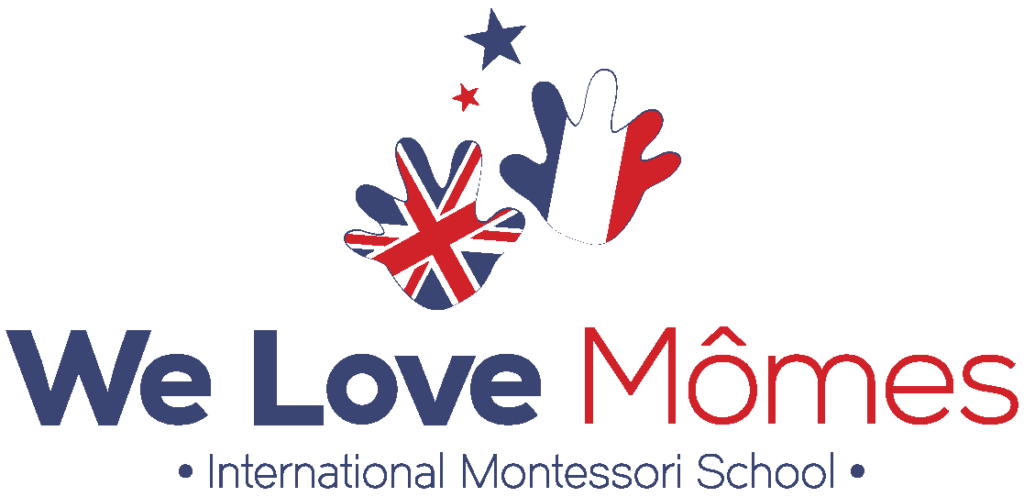Extra-curricular activities
All our extra-curricular activities take place at our school, within easy reach of your child. In the words of Dr. Maria Montessori, “the environment must be motivating in order to arouse interest in an activity and invite the child to conduct his own experiments.”
EXTRA-CURRICULAR ACTIVITIES: AWAKENING BODY, MIND AND EMOTIONS
Le club d'anglais le matin
Par des activités amusantes et engageantes les enfants découvrent la pratique de la langue anglaise. Des ateliers variés sur l’art, le bricolage, la cuisine, … sont fait en anglais. C’est une merveilleuse manière d’apprendre une langue en s’amusant. En savoir plus sur le Club d’anglais du mercredi.
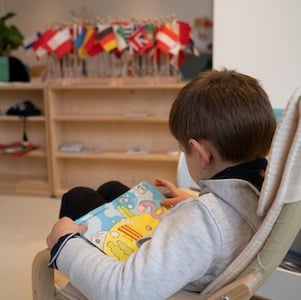
La Forest School bilingue l'après-midi
les enfants découvrent la nature dans la foret près de l’école. Encadré par une éducatrice spécialisée dans l’approche Forest School, il découvre la nature en s’amusant. Mais aussi apprennent l’anglais avec une accompagnatrice anglophone. En savoir plus sur les mercredis Forest-School.
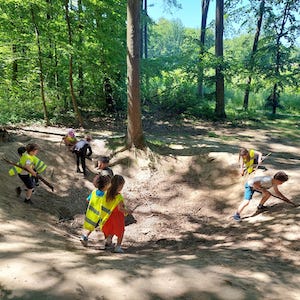
DÉROULEMENT DE LA JOURNÉE DU MERCREDI DANS NOTRE ÉCOLE MONTESSORI
Une immersion en anglais dès 8h30 pendant l'activité extra scolaire
La journée commence par un "Circle Time"
We offer one extra-curricular activity a day for children aged 2½ and over.
Children in the Maison des enfants (kindergarten) environment attend their activities between 4:00 and 5:00 pm. They start with a free session in mid-September and finish at the same time as the end of the school year.
S'ensuivent des cours par petit groupe de 4-5 enfants
Après le “Cercle Time”, les enfants participent à diverses activités jusqu’à midi. Ils sont immergés dans la langue anglaise grâce à une variété d’activités telles que des cours utilisant des flashcards pour l’apprentissage du nouveau vocabulaire. Les activités sensorielles permettent aux enfants de passer de l’abstrait au concret en fabriquant des objets en papier, en explorant l’art plastique et la peinture, ainsi qu’en participant à des séances de cuisine où ils peuvent découvrir des recettes anglophones.
L’objectif est de rendre l’apprentissage de l’anglais interactif et créatif, tout en encourageant les enfants à s’exprimer et à communiquer en anglais de manière ludique.
Puis vient l'heure du repas
À travers une grande variété d’activités ludiques et éducatives, des chants, des livres, des créations artistiques manuelles, du bricolage, des activités sensorielles, au rythme des saisons et des festivités, les enfants sont constamment exposés à la langue anglaise. Nos enseignants et le personnel parlent exclusivement en anglais, ce qui encourage les enfants à pratiquer la langue de manière naturelle et spontanée. Le goûter ainsi que le repas se prennent ensemble, toujours en anglais avant de continuer la journée par la sortie en forêt.
La Forest School : Des sorties en forêt tous les après-midis
Après les activités en anglais le matin en classe, nous organisons tous les mercredis après-midi des sorties en forêt. Accompagnés par une enseignante francophone et une autre anglophone, la Forest School offre aux enfants l’occasion de mettre en pratique leurs compétences linguistiques dans un environnement réel, tout en découvrant la nature et en développant leur sensibilité pour l’environnement. Ils améliorent également leur coordination physique à travers des jeux en plein air et des projets collaboratifs en lien avec la nature. Nous constatons rapidement l’évolution de l’estime de soi et des compétences sociales de chaque enfant dans le groupe auquel il appartient.
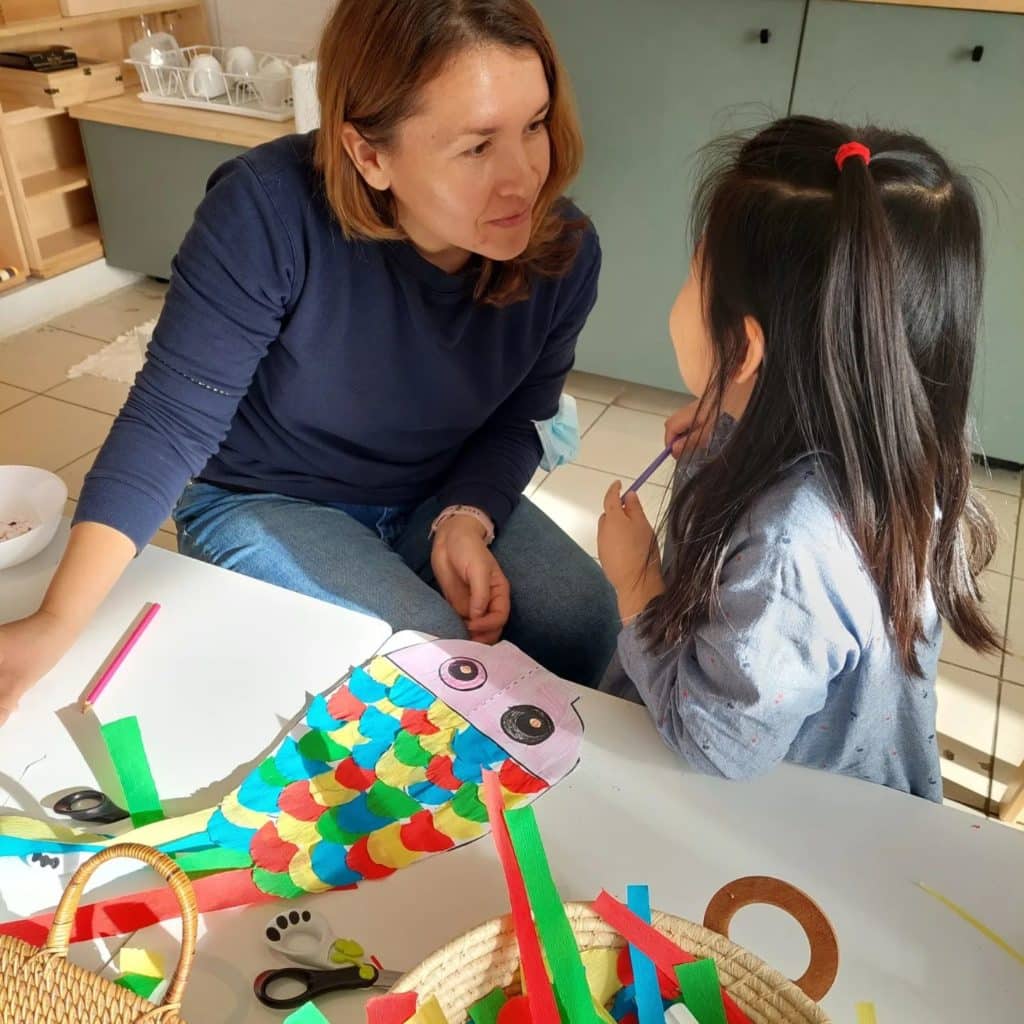
OUR SPEAKERS
All our after-school activity leaders have a minimum of 5 years’ experience with children in each age group. They are familiar with Montessori pedagogy and converge on this way of working with children.
We also offer free activities and workshops during class hours, such as philosophy or screen-free coding.
CHOOSE AN EXTRA-CURRICULAR ACTIVITY
According to Dr. Michel Binder, pediatrician and sports physician, who talks about children, “the more they are stimulated on a sensory and bodily level, the more at ease they are in their school learning.”
To make the right choice of extracurricular activities, we recommend that you take into account your child’s tastes and personality.
We therefore recommend taking stock and explaining our various extra-curricular activities. Just a reminder that it is above all a time for relaxation and learning for your child!
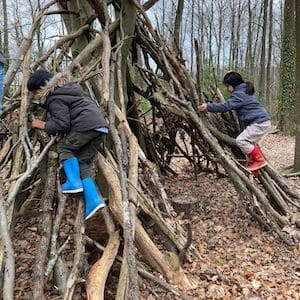
Extra-curricular sports activities
Sport entertains children, titillates their competitive spirit and channels their often boundless energy. But beyond the fun aspect, extracurricular sports activities are conducive to children’s learning and development.
On a physical level, sport increases children’s heart and lung capacity, and strengthens the skeleton. It also helps children gain a better understanding and acceptance of their bodies, which is essential during adolescence, while reducing the risk of becoming overweight. It develops psychomotor skills and coordination.
On a social level, sport, especially team sports, is an excellent vehicle for solidarity and team spirit. Indeed, from a certain age onwards, a sporting activity conveys notions of discipline and fair play, as well as respect for one’s opponent.
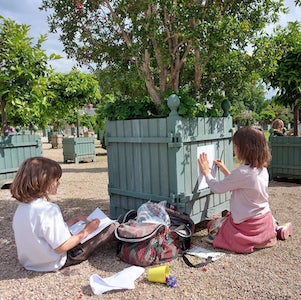
Artistic extra-curricular activities
Artistic extracurricular activities are another great way to unwind and give free rein to your creativity.
Music classes are often places for sharing and listening, where children express themselves without judgment. They evolve at their own pace and gain confidence.
In drawing or painting lessons, the aim is to let the child’s imagination run free. He’s free to create, and just needs guidance on how to dose the paint and hold the brush…
Our theater workshops are based on improvisation and spontaneity. The aim is to invent stories and build characters based on children’s everyday lives: at home, at school… They express themselves in a space-time universe other than their own, and this allows the shy to let go and the active to channel themselves.
“We have seen children change completely as they acquire a love for things and as their sense of order, discipline and self-control develop within themselves…” Dr. Maria Montessori
